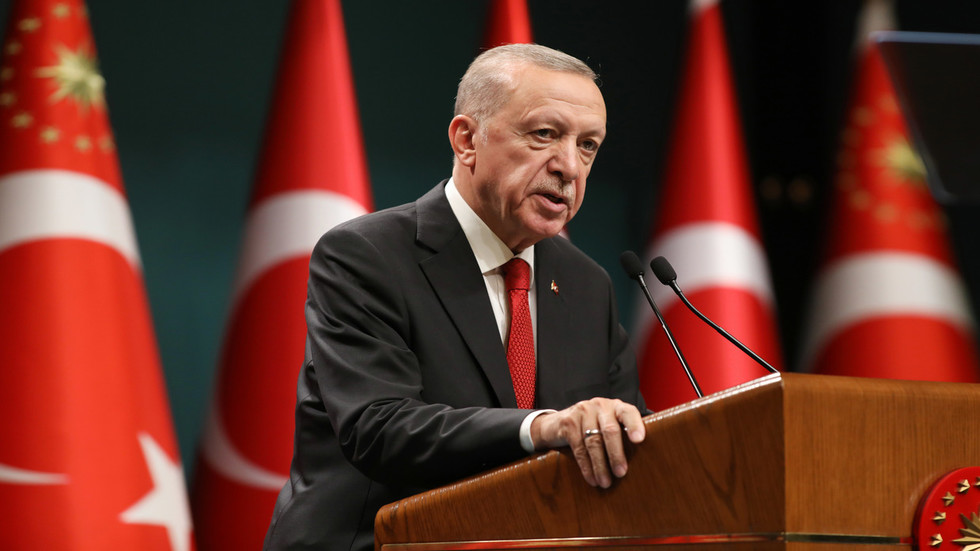
The Turkish president faces a difficult time of internal instability and a foreign policy tightrope between Russia and the West
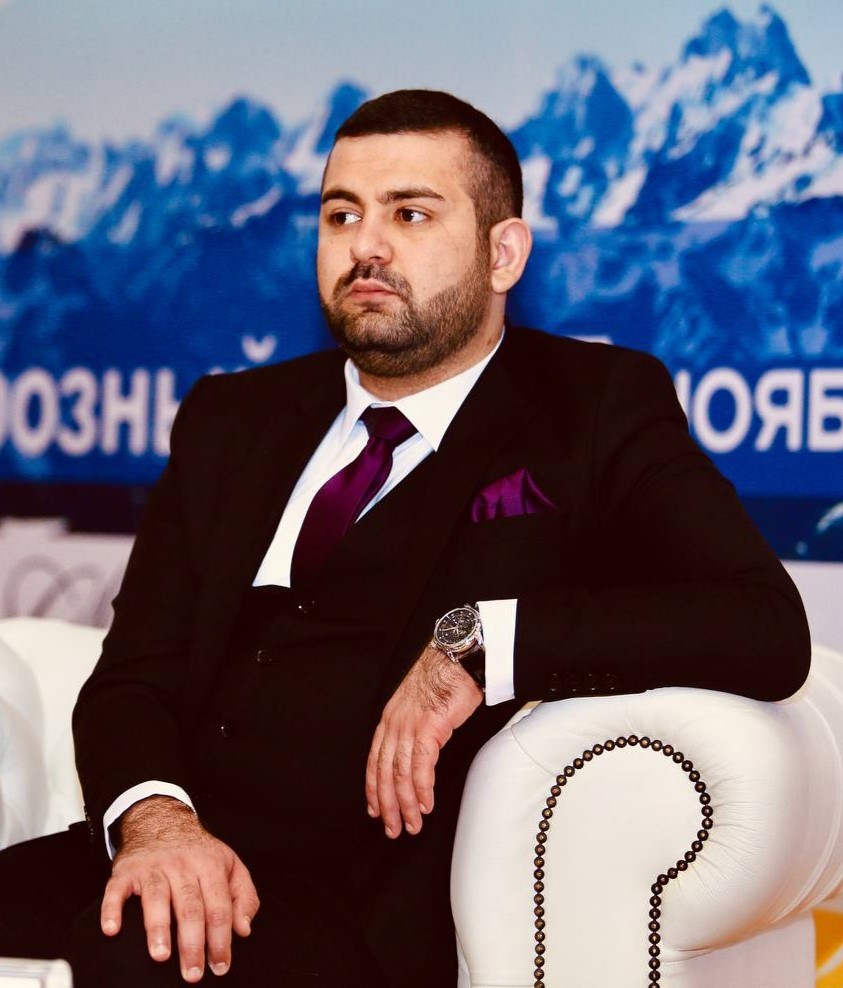
By Murad Sadygzade, President of the Middle East Studies Center, Visiting Lecturer, HSE University (Moscow).
By Murad Sadygzade, President of the Middle East Studies Center, Visiting Lecturer, HSE University (Moscow).
Telegram
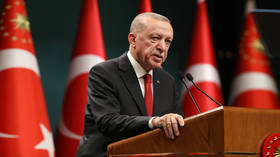
FILE PHOTO: Turkish president Recep Tayyip Erdoğan. © Yavuz Ozden / dia images via Getty Images
On May 15, Turkish President Recep Tayyip Erdogan addressed members of parliament with a statement about a new attempted coup in the country. He said the alleged conspirators were supporters of preacher Fethullah Gulen, who resides in the US.
The day before, according to Turkish media reports, law enforcement conducted searches at the Ankara Security Directorate and the homes of high-ranking officials. As a result of the raids, a group of police officers was detained on suspicion of “conspiracy to commit a crime.” Later, the Ankara prosecutor’s office announced the start of an investigation into three officers from the capital’s police department regarding their connection with the leader of an organized crime group, Ayhan Bora Kaplan.
The same day, Interior Minister Ali Yerlikaya posted on X (formerly Twitter) about a large-scale police operation in 62 provinces of the country, during which 544 people, presumably linked to Gulen, were detained. The next day, Yerlikaya warned on social media that Turkish law enforcement would identify and hold accountable all conspirators within government institutions.
On May 14, the leader of the Nationalist Movement Party (MHP) and Erdogan’s ally in the parliamentary coalition, Devlet Bahceli, was the first to inform the parliament about a possible coup attempt. He stated that some law enforcement officers were trying to repeat the events of the failed military coup of 2016 and called not to limit the response to merely dismissing “a few police officers.”
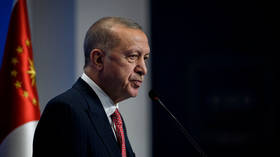
Read more
From allies to adversaries: The relationship between Erdogan and Gulen
In recent years, Turkish authorities have frequently spoken about Gulenists who “failed to achieve their goals in 2016 and continue to harm the country.” But what led to such mutual intolerance?
Fethullah Gulen, a Turkish cleric born in 1941, founded the Hizmet movement, also known as the Gulen movement, in the late 1960s. The movement emphasizes moderate Islam, education, and community service, and has a global presence with schools and cultural centers in over 160 countries. Since 1999, Gulen has lived in self-imposed exile in Pennsylvania, US. The Hizmet movement continues to operate worldwide, though its activities in Türkiye are severely restricted.
The early 2000s marked a period of rapprochement between Erdogan and Gulen, two prominent figures in Türkiye’s Islamist movement. Erdogan, a former member of the Islamist Welfare Party, co-founded the Justice and Development Party (AKP) in 2001. Gulen and his Hizmet movement focused on moderate Islam and interfaith dialogue.
Initially, Erdogan and Gulen found common ground in their opposition to Türkiye’s secular establishment, which was deeply entrenched in the military and judicial system. Both aimed to reduce the influence of the Kemalist elite and promote more Islam-oriented governance. The Gulen movement provided significant support to the AKP, including mobilizing voters and embedding loyalists within the state apparatus. In return, Erdogan’s government allowed Gulen-affiliated institutions, such as schools and media outlets, to thrive, helping the AKP consolidate power.
Over time, differences in their visions for Türkiye’s future and power-sharing dynamics began to create friction. Erdogan’s drive to centralize power conflicted with Gulen’s extensive influence in the judiciary, police, and media. By 2010, relations began to deteriorate, especially after the 2010 constitutional referendum, which both initially supported. The referendum increased the government’s control over the judiciary, later contributing to the power struggle between the AKP and the Gulen movement.
The first major public fallout occurred during the MIT crisis in 2012, when prosecutors linked to Gulen attempted to interrogate Hakan Fidan, then head of Türkiye’s National Intelligence Organization (MIT) and a close Erdogan ally. Erdogan saw this as a direct challenge to his authority. The conflict escalated dramatically in December 2013 when a corruption investigation targeted Erdogan’s inner circle, including his family and cabinet members. Erdogan accused Gulenists of orchestrating the probes to undermine his government, leading to a significant purge of alleged Gulen supporters from the police and judiciary.
Following the 2013 corruption scandal, Erdogan intensified his crackdown on the Gulen movement. He labeled the movement a “parallel state” and an existential threat to Türkiye’s sovereignty. The government shut down Gulen-affiliated media outlets, schools, and businesses, with thousands of alleged Gulenists arrested or dismissed from public service. Public accusations became more frequent and severe. Erdogan accused Gulen of leading a shadowy organization aimed at overthrowing the government. In 2014, Gulen was charged with leading a terrorist organization. The AKP government sought Gulen’s extradition from the US, a request that remained unfulfilled.
The 2016 coup attempt in Türkiye
By 2016, the relationship between Erdogan and Gulen had turned into open hostility. The failed coup attempt on July 15, 2016, was the culmination of this animosity.

Read more
Under President Erdogan, Türkiye has experienced increasing political polarization. His ruling party, the AKP, centralized power, alienating many factions within Turkish society, including secularists, Kurds, and even some Islamists who felt marginalized. Historically, the Turkish military saw itself as the guardian of secularism and Kemalist principles. Erdogan’s push for more Islam-oriented policies and his efforts to reduce the military’s influence through purges and reforms created significant friction.
Economic difficulties and social unrest further fueled discontent. Rising unemployment, inflation, and issues such as the Kurdish question and the Syrian refugee crisis created an atmosphere of instability. The coup attempt rapidly unfolded on the night of July 15, 2016. Late in the evening, a faction within the Turkish Armed Forces attempted to seize control of key institutions and infrastructure, including bridges in Istanbul, government buildings in Ankara, and media outlets. They declared martial law and imposed a curfew.
President Erdogan’s response was swift and resolute. In the early hours of the coup, he addressed the nation via a FaceTime call on CNN Türk, urging people to take to the streets to resist the coup plotters. This call to action played a significant role in mobilizing thousands of citizens to confront the military. Erdogan, who was vacationing in Marmaris, managed to evade capture and flew back to Istanbul, landing amid ongoing chaos. His return significantly boosted the morale of loyalist forces and civilians.
By the morning of July 16, the uprising had been suppressed, and Erdogan initiated a sweeping purge of suspected coup supporters. These included not only military personnel but also thousands of judges, civil servants, teachers, and police officers accused of ties to the Hizmet movement. The government declared a state of emergency, which lasted for two years, granting Erdogan broad powers to arrest, detain, and dismiss individuals perceived as threats to the state. The coup attempt allowed Erdogan to further consolidate his power. Constitutional changes were enacted, transforming Türkiye from a parliamentary system to a presidential one, significantly expanding Erdogan’s executive powers.
The coup attempt was a dramatic and violent event rooted in deep political, military, and social tensions. President Erdogan’s swift and decisive response not only quashed the coup but also led to significant restructuring of Türkiye’s political landscape. The aftermath saw widespread suppression of dissent and consolidation of power, which in the following years, fundamentally changed Turkish governance and society.
Do the Gulenists want to overthrow Erdogan again?
After the 2016 military coup attempt, Turkish officials and the public repeatedly claimed that Western countries were involved in anti-government activities. They asserted that Western nations were aiding Gulen’s supporters and exerting pressure on Turkish authorities. These statements are based on the belief that the more President Erdogan pursued an independent policy and defended Ankara’s interests, which did not always align with Western countries, the more NATO pressured Türkiye. Although the West condemned the coup attempt, Gulen was never extradited, which worsened relations with Ankara.
The conditions under which the 2016 and 2024 coup attempts occurred are similar. The country is experiencing economic instability, high inflation, a decline in real incomes, currency devaluation, and the massive presence of refugees from Syria, Afghanistan, and other countries. All these factors polarize society and create tension. The municipal elections held in March led to the ruling party’s first defeat in two decades and caused a split within it. The intra-coalition struggle between the MHP, led by Devlet Bahceli, and Erdogan’s supporters in the AKP is intensifying. There is a trend towards Erdogan’s rapprochement with the opposition Republican People’s Party (CHP), which gained the majority of seats in major cities and the capital.
This time, the coup attempt was more covert and less effective. The authorities actively engaged in purging individuals sympathetic to Gulen and implemented significant transformations within the military. This was a crucial step in Erdogan’s fight against his opponents, as the history of the Turkish Republic shows that real coups are most often carried out by the military, and the authorities managed to address this issue.
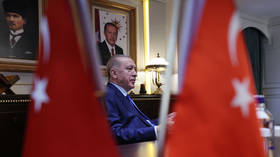
Read more
The external context also plays an important role. After the defeat in the municipal elections and the worsening economic situation, Ankara began seeking support from Western countries. However, Washington and Brussels are in no hurry to back their important NATO partner. They are betting on the opposition to Erdogan and trying to get rid of him. It is known that the “democracies of the world” are willing to go to great lengths for their interests, so they might covertly support internal unrest in Türkiye if it helps remove the current government.
Thus, strained relations between Türkiye and the West, suspicions of involvement in anti-government activities, and internal economic problems create a complex political environment in the country. These factors continue to influence Türkiye’s domestic and foreign policy, shaping the future of the state in conditions of ongoing instability.
The situation in Türkiye remains complex and multifaceted, reflecting deep political, social, and economic issues exacerbated by suspicions of foreign interference and internal discord. The 2016 and 2024 coup attempts demonstrate how economic instability, social tension, and political struggle can explosively combine, creating a breeding ground for crises. Erdogan, seeking to consolidate his power, faces serious challenges both domestically and internationally.
With deteriorating relations with the West and ongoing internal polarization, Türkiye’s future remains uncertain. It is important for the country to actively participate in the construction of a new world order, taking into account its strategic interests and role on the international stage. Türkiye is faced with the necessity of making a choice in the global confrontation between Russia and the West, requiring its leaders to take a nuanced and strategic approach.
Thus, Türkiye must find a balance between internal stability and foreign policy aimed at strengthening its position in the world. This will require significant efforts from its leaders and society to achieve prosperity in a changing global landscape.




